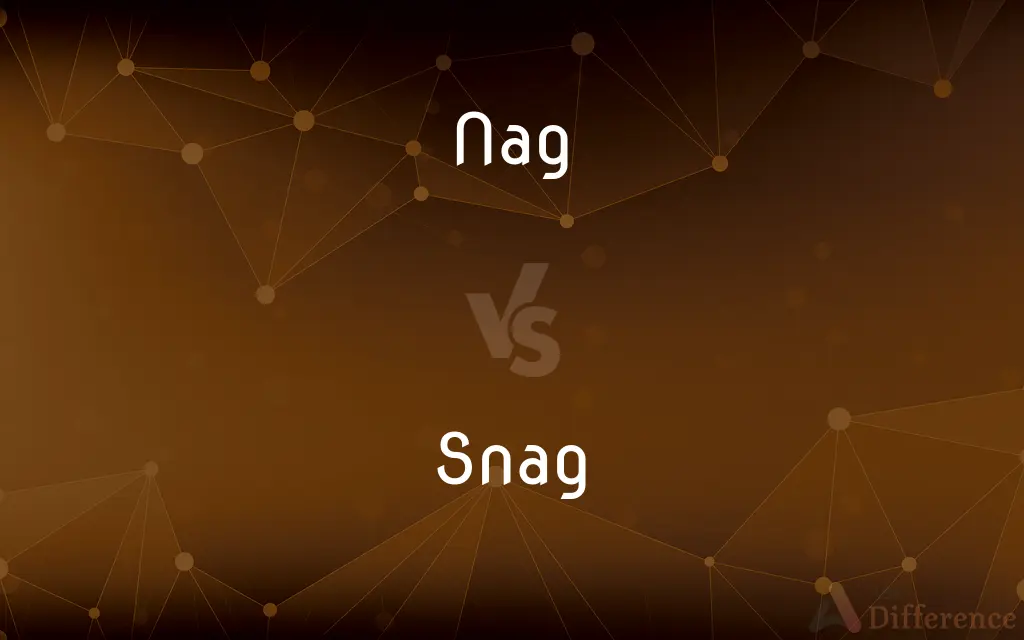Nag vs. Snag — What's the Difference?
Edited by Tayyaba Rehman — By Maham Liaqat — Updated on April 16, 2024
Nag refers to persistently annoying or finding fault, while snag denotes encountering an unexpected obstacle or hitch.

Difference Between Nag and Snag
Table of Contents
ADVERTISEMENT
Key Differences
Nag involves persistent annoyance or fault-finding often through repeated reminders or complaints, aimed typically at influencing someone's behavior or actions. On the other hand, snag refers to encountering a sudden or unforeseen difficulty or obstacle, usually disrupting progress or plans.
Nagging is commonly associated with interpersonal relationships, where one party repeatedly makes known their dissatisfaction or demands to another, often in a manner perceived as bothersome or irritating. Whereas, snagging generally occurs in contexts such as projects, events, or mechanical operations, marking a hiccup that requires resolution.
While nagging often has a negative connotation, implying excessive or irritating repetition, snagging does not carry inherent negative emotional context but highlights a practical problem that needs addressing.
Nagging can be verbal, such as repeatedly asking someone to do chores, or non-verbal, such as sighing or rolling eyes to express dissatisfaction repeatedly. Conversely, a snag is typically a specific issue or problem, such as a software bug or a tear in fabric, which is tangible and often requires a specific solution.
The verb to nag is used to describe the action of someone who nags, focusing on the continuity and frequency of the action. In contrast, the noun snag describes the actual problem encountered, focusing on the nature of the interruption or difficulty.
ADVERTISEMENT
Comparison Chart
Definition
Persistent annoyance or criticism
An unexpected or hidden obstacle
Context
Interpersonal relationships
Projects, events, mechanical issues
Connotation
Negative, irritating
Neutral, practical
Form
Can be verbal or non-verbal
Usually tangible
Solution Focus
Changing behavior
Resolving a specific issue
Compare with Definitions
Nag
To be a constant source of worry or annoyance.
The thought of the approaching deadline nags him.
Snag
A tear or rupture in a fabric.
Her new dress got a snag from a nail.
Nag
To bother with persistent reminders.
She nags her students about the importance of given time.
Snag
A sharp, angular, or jagged projection.
He caught his sweater on a snag in the fence.
Nag
To irritate or torment persistently.
The child nags his mother for a new toy.
Snag
A hidden or unforeseen drawback.
The contract had a few snags we didn't anticipate.
Nag
To find fault incessantly.
He nags about the smallest details at work.
Snag
An opportunity or benefit arising unexpectedly.
He snagged a cheap flight at the last minute.
Nag
Harass (someone) constantly to do something that they are averse to
He's always nagging at her for staying out late
She nagged him to do the housework
She constantly nags her daughter about getting married
Snag
A sudden or unexpected obstacle.
They hit a snag in the negotiations.
Nag
A person who nags someone to do something.
Snag
A tree or a part of a tree that is sunken in or protrudes above a body of water and is a danger to navigation.
Nag
A horse, especially one that is old or in poor health
The old nag the lad fetched smelled sweaty
Snag
A snaggletooth.
Nag
To annoy by constant scolding, complaining, or urging.
Snag
A short or imperfectly developed branch of a deer's antler.
Nag
To torment persistently, as with anxiety or pain.
Snag
A break, pull, or tear in fabric.
Nag
To scold, complain, or find fault constantly
Nagging at the children.
Snag
An unforeseen or hidden obstacle or difficulty
Our plans for the party have hit a snag.
Nag
To be a constant source of anxiety or annoyance
The half-remembered quotation nagged at my mind.
Snag
To tear, break, hinder, or destroy by or as if by a snag
Snagged a stocking on a splinter.
Nag
One who nags.
Snag
(Informal) To catch or obtain quickly or unexpectedly
Snagged a ground ball.
Snagged a bargain.
Nag
An old or worn-out horse.
Snag
To free of snags
Snagged the river.
Nag
(Slang) A racehorse.
Snag
To catch (a fish), especially by hooking in a place other than its mouth.
Nag
(Archaic) A small saddle horse or pony.
Snag
To be damaged by a snag
His sweater snagged on a tree branch.
Nag
A small horse; a pony.
Snag
A stump or base of a branch that has been lopped off; a short branch, or a sharp or rough branch.
Nag
An old, useless horse.
Snag
A tree, or a branch of a tree, fixed in the bottom of a river or other navigable water, and rising nearly or quite to the surface, by which boats are sometimes pierced and sunk.
Nag
A paramour.
Snag
(by extension) Any sharp protuberant part of an object, which may catch, scratch, or tear other objects brought into contact with it.
Nag
Someone or something that nags.
Snag
A tooth projecting beyond the others; a broken or decayed tooth.
Nag
A repeated complaint or reminder.
Snag
(figuratively) A problem or difficulty with something.
We hit a snag
Nag
A persistent, bothersome thought or worry.
Snag
A pulled thread or yarn, as in cloth.
Nag
(ambitransitive) To repeatedly remind or complain to (someone) in an annoying way, often about insignificant or unnecessary matters.
Anyone would think that I nagged at you, Amanda! (From Amanda! by Robin Klein)
Snag
One of the secondary branches of an antler.
Nag
To bother with persistent thoughts or memories.
The notion that he forgot something nagged him the rest of the day.
Snag
A light meal.
Nag
To bother or disturb persistently in any way.
A nagging pain in his left knee
A nagging north wind
Snag
A sausage.
Nag
A small horse; a pony; hence, any horse, especially one that is of inferior breeding or useless.
Snag
A goal.
Nag
A paramour; - in contempt.
Snag
A misnaged, an opponent to Chassidic Judaism (more likely modern, for cultural reasons).
Nag
A person who nags, especially habitually; called also nagger.
Snag
To catch or tear (e.g. fabric) upon a rough surface or projection.
Be careful not to snag your stockings on that concrete bench!
Nag
To tease in a petty way; to scold habitually; to annoy; to fret pertinaciously.
Snag
To damage or sink (a vessel) by collision; said of a tree or branch fixed to the bottom of a navigable body of water and partially submerged or rising to just beneath the surface.
The steamboat was snagged on the Mississippi River in 1862.
Nag
Someone (especially a woman) who annoys people by constantly finding fault
Snag
(fishing) To fish by means of dragging a large hook or hooks on a line, intending to impale the body (rather than the mouth) of the target.
We snagged for spoonbill from the eastern shore of the Mississippi River.
Nag
An old or over-worked horse
Snag
To obtain or pick up.
Ella snagged a bottle of water from the fridge before leaving for her jog.
Nag
Bother persistently with trivial complaints;
She nags her husband all day long
Snag
To cut the snags or branches from, as the stem of a tree; to hew roughly.
Nag
Worry persistently;
Nagging concerns and doubts
Snag
A stump or base of a branch that has been lopped off; a short branch, or a sharp or rough branch; a knot; a protuberance.
The coat of armsNow on a naked snag in triumph borne.
Snag
A tooth projecting beyond the rest; contemptuously, a broken or decayed tooth.
Snag
A tree, or a branch of a tree, fixed in the bottom of a river or other navigable water, and rising nearly or quite to the surface, by which boats are sometimes pierced and sunk.
Snag
One of the secondary branches of an antler.
How thy snag teeth stand orderly,Like stakes which strut by the water side.
Snag
To cut the snags or branches from, as the stem of a tree; to hew roughly.
Snag
To injure or destroy, as a steamboat or other vessel, by a snag, or projecting part of a sunken tree.
Snag
A sharp protuberance
Snag
An opening made forcibly as by pulling apart;
There was a rip in his pants
She had snags in her stockings
Snag
An unforeseen obstacle
Snag
Catch on a snag;
I snagged my stocking
Snag
Get by acting quickly and smartly;
Snag a bargain
Snag
Hew jaggedly
Common Curiosities
How can nagging affect relationships?
Persistent nagging can strain relationships, leading to frustration and resentment.
How should one deal with a snag in a project?
Addressing a snag in a project typically involves identifying the issue, assessing its impact, and implementing a solution.
Are there positive aspects of nagging?
While often viewed negatively, nagging can sometimes be a motivator for change or action.
How can one minimize nagging in a relationship?
Clear communication, setting mutual expectations, and understanding each other’s needs can help minimize nagging.
What does it mean to nag someone?
To nag someone means to annoy them by frequently making demands or complaining.
What is a common example of a snag?
A common example of a snag is encountering a software bug during development.
What are synonyms for nag?
Synonyms for nag include badger, harp, and hassle.
What type of personality tends to nag more?
People who are perfectionists or have high anxiety might tend to nag more.
Can a snag be beneficial?
Yes, sometimes a snag can lead to better solutions or innovations.
Can nagging be constructive?
If approached tactfully, nagging can sometimes be constructive by prompting necessary actions.
What are synonyms for snag?
Synonyms for snag include hitch, hurdle, and obstacle.
How do organizations plan for potential snags?
Organizations plan for potential snags by risk assessment, contingency planning, and proactive management.
What might cause a snag in a mechanical system?
Wear and tear, design flaws, or lack of maintenance can cause snags in mechanical systems.
Share Your Discovery

Previous Comparison
Pozzolana vs. Pozzolan
Next Comparison
Orientation vs. OnboardingAuthor Spotlight
Written by
Maham LiaqatEdited by
Tayyaba RehmanTayyaba Rehman is a distinguished writer, currently serving as a primary contributor to askdifference.com. As a researcher in semantics and etymology, Tayyaba's passion for the complexity of languages and their distinctions has found a perfect home on the platform. Tayyaba delves into the intricacies of language, distinguishing between commonly confused words and phrases, thereby providing clarity for readers worldwide.
















































